Our Projects

Battling Plastic with Bamboo Straws
Read More

Sukau Ecotourism Research Centre (SERC)
Read More

Artificial Hollows to Save Hornbills
Read More

Borneo Land Conservancy
Read More

Kinabatangan Bee Farming
Read More

Organic Vegetable Farming
Read More
We focus on grassroots conservation, education and the introduction of improved technologies among indigenous rural communities to enable livelihood improvement through sustainable agriculture practices and greater integration between nature and communities.
Past Projects
1996
Weed Clearing at Kelenanap Oxbow Lake
Weed Clearing at Kelenanap Oxbow Lake
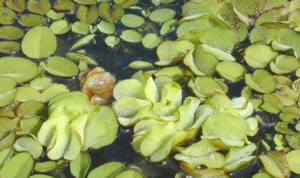 The Minister of Tourism and Environmental Development YB Tan Sri Bernard Dompok launched this project during the official opening of the Sukau Rainforest Lodge in 1996. Twenty tourism students from Stamford College participated in the weed clearing project at the Kelenanap Oxbow Lake in Sukau village for four days. The 300 acres Kelenanap oxbow lake was the traditional fishing ground of the Orang Sungai people and well as the feeding ground for fresh water otters and Oriental darters while the surrounding forest is the natural habitat of local wildlife including proboscis monkeys, orangutans, elephants, deers among others. The lake has been completely carpeted by weeds called “Salvinia molesta” thus depriving the local people of fishing.
The Minister of Tourism and Environmental Development YB Tan Sri Bernard Dompok launched this project during the official opening of the Sukau Rainforest Lodge in 1996. Twenty tourism students from Stamford College participated in the weed clearing project at the Kelenanap Oxbow Lake in Sukau village for four days. The 300 acres Kelenanap oxbow lake was the traditional fishing ground of the Orang Sungai people and well as the feeding ground for fresh water otters and Oriental darters while the surrounding forest is the natural habitat of local wildlife including proboscis monkeys, orangutans, elephants, deers among others. The lake has been completely carpeted by weeds called “Salvinia molesta” thus depriving the local people of fishing.
A total of five groups of volunteers participated in this project. These include Stamford College, Likas Baptist Church, Sabah Foundation Sports Club and nine girls students from Royal School and twelve girls from Tudor Hall, the last two groups being from England.
Borneo Eco Tours and Sukau Rainforest Lodge set aside a total of 1,000 complimentary rooms’ nights, and contributed free T-shirts, certificate, transportation and logistics to organise this project. A total of 120 rooms were used for this project. While the project did not manage to control the spread of the weeds in the lake, it has managed to raise awareness both at the local and international level of the negative impact of environmental problems related to weeds.
1997
Nursing Wildlife and Birds
Nursing Wildlife and Birds
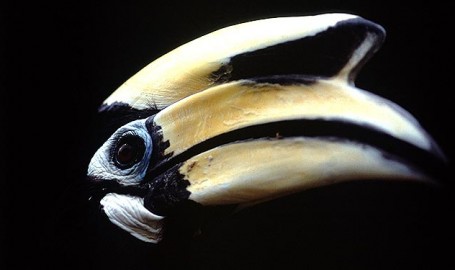
The idea of rehabilitation of birds in Sukau Rainforest Lodge started when in 1997 the staff rescued a baby buffy fish owl with a broken leg and nursed it back to health at the staff quarter. The owl, nick-named “STINGKY” was released when we were sure it could take care of itself. But Stingky continued to stay around the Lodge after its release although less frequently as time went on.Since then with the support of Wildlife Department, we have rehabilitated one pangolin, one rhinoceros hornbill and two pied hornbills and released them into the forest behind the Lodge.
Mompilis Environmental Cleanup
Mompilis Environmental Cleanup
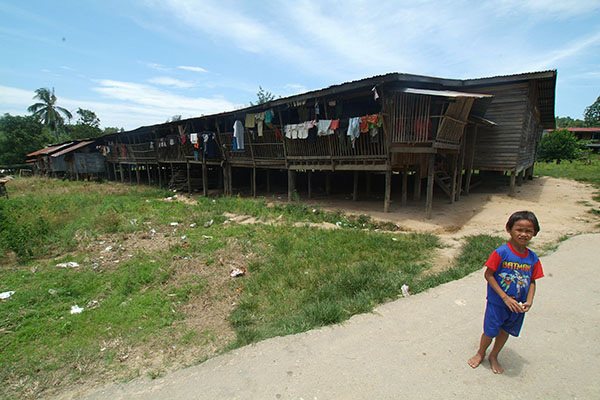
In 1997 once again at the request of World Challenge of the UK to put together a project for their eleven volunteer students from Monmouth School, we organised an environmental clean-up at and around a Rungus longhouse at Mompilis.
The objective was to inculcate the importance of keeping the surrounding clean and to break the habit of littering among the Rungus community. Secondly tour operators including our company has often brought international tourists to this longhouse. We felt it was time we helped them out with such a project as our contribution towards this longhouse. This project was very well received by the Rungus community who was very appreciative of the effort of the visiting students. The tourists on the other hand also benefited much from the kind hospitality of the Rungus while witnessing at close hand how the Rungus lived in traditional longhouses.
2000
Kwicorp
KINABATANGAN WILDLIFE CORRIDOR REHABILITATION PROGRAM
Sukau Rainforest Lodge’s (SRL) tree planting project was recently renamed ‘KWICORP’, which is an acronym for Kinabatangan Wildlife Corridor Rehabilitation Program. The project which is run by the staff at SRL and BET, aims to regenerate a 64 acres site of riverine forest corridor along the lower Kinabatangan River in Sabah, Malaysia.
This lower section of the Kinabatangan River has been recognised nationally and internationally as one of the worlds most biodiverse regions. Sections of this area were recently gazetted as protected wildlife sanctuary, further proving such recognition.
The KWICORP project aims to regenerate forest in one of the many ‘gaps’ or fragments along the river, by planting local tree seedlings at the site.
Since its inception in 2000, a total of RM 43,329 was spent on this effort and donation received from volunteers is RM 31,809. A total of 4,459 tree seedlings were purchased from the local community and planted at the site.
The importance of maintaining this forest corridor primarily lies in the following:
- The riverine fringe provides good fish habitat, and good fish stocks are important to the local people (Orang Sungai) because fishing in the lower Kinabatangan region is one of their main sources of income.
- Providing habitat for wildlife in the lower Kinabatangan Region is necessary in an area which has already lost large tracts of natural habitat to past and present land uses, particularly that of palm oil estates.
- Riverine vegetation provides bank stabilization and reduces soil erosion due to tidal fluctuations and waves created by the movement of boats along the Kinabatangan River.
The project was officiated on the 4th June 2000 by the Assistant Tourism Development, Environment, Science and Technology, Datuk Hj Nahalan Hj Damsal, and at the time incorporated 64 acres of river land near Tenegang Kecil, in the lower Kinabatangan Region.
There were a number of factors causing the slow progress of this project in the early stages. They are summarised as the following:
- Soil at the site is quite compacted due to the site previously being a logging dump i.e. difficult for the roots of the young trees to establish themselves.
- Soil is infertile and lacking in organic matter in majority of the site.
- Elephants were previously trampling the area during their migration (currently fencing from neighbouring palm oil estates inhibits this).
- Flooding has occurred on a number of occasions with flood levels at times 1.5 to 2m high; most recent flooding occurred in 2006. Seedlings which are not well established or above the flood levels do not survive.
- Insects attack the foliage of the young leaves, slowing down the overall growth rate of the seedling, and sometimes resulting in death of the seedling.
- Previously a lack of site maintenance; lack of experience and weeds (especially climbers) were hindering the growth of the trees.
Prior to September 2007, guests staying at SRL contributed to the project by planting a tree at the KWICORP site as part of their tour package. However this program was changed in mid-September for two reasons in particular:
- The trees planted at the KWICORP site were already at a high density of trees per area.
- Urgent site maintenance work was required in regards to containing weeds at the site, and soil improvement activities on a regular basis.
As a result the activities at the KWICORP site have now been limited to the staff members of SRL and incorporate site maintenance and soil improvement activities. Guests who stay at SRL are still given the opportunity to visit the site and are informed of SRL and BET’s conservation efforts through the guides and slide show presentation at SRL. Furthermore, guests are still invited to contribute to the project through donation.
The staff at SRL are currently in charge of the activities related to KWICORP. These have been summarised below, although they are not limited to the following. Rather they were the recommendations left to them by an Australian work experience student before her departure in mid December 2007. They are summarised as the following:
Recommended actions for SRL staff in regards to the maintenance of the KWICORP site:
1.) Conduct site maintenance and soil improvement activities
Ensure the weeds are not smothering the trees planted by cutting back the weeds
Place dead leaves and/or water hyacinth around the trees planted (as a mulch)
Place elephant dung around the trees planted (as a fertiliser/soil improver)
Bury kitchen food scraps near the trees planted (as a fertiliser/soil improver)
2.) Collection of soil improvement materials
Collect dead leaves in sacks to take to the tree planting site (i.e. when raking is done around the lodge site, collect the leaves which have been raked)
Search for and collect elephant dung
(N.B. only when they are in the area and when the dung is dry i.e. no rain for a few days)
Collect vegetable and fruit scraps from the kitchen in a separate bag
3.) Evaluation and monitoring
It is recommended that a meeting with management staff is held once a month to report on the activities conducted for KWICORP and any observations in regards to the progress of the project. The people who should be present include the manager and/or assistant manager, Hassan and Ali (from the gardening department) and Winston (resident naturalist/guide). The meeting minutes or outcomes should then be forwarded to the KK and Sandakan offices.
The recommended actions in points 1 and 2 above need to be conducted on a regular basis. The number of times and the time of day the site is visited each week will vary according to climatatic conditions i.e. rain, extreme heat. However staff should be consistent with the maintenance of the KWICORP site and also persistent in their efforts to rehabilitate the site as a contribution to conservation in the lower Kinabatangan Region.
In summary, although there have been a number of significant issues affecting the progress of KWICORP, there is evidence at the site of successful plantings from previous years, and thus it can be said that the overall aim of the project to rehabilitate degraded land is being achieved to an extent.
More valuable is the lesson learned by the staff that all successes come from the need for self discipline, perseverance in the face of challenges, learning from mistakes and right attitude. With the continued persistency of the staff at SRL with this challenge, and through the financial and moral support and advice from Borneo Eco Tours, work experience students and international guests staying at SRL who have knowledge in this field, KWICORP has the potential to become a base model for successful rehabilitation of degraded land in the lower Kinabatangan region.
Borneo Eco Tours has recently in February 2008 made a request to the government to identify another site for KWICORP Phase II project.
2009
Tree Planting in Kinabatangan
Tree Planting in Kinabatangan
 Among the aims and focus of the Kinabatangan Wildlife Corridor Rehabilitation Program KWICORP tree planting project in Kinabatangan area, to restore and increase wildlife habitats and at the same time create wildlife corridors. Aside from that, this project also has the intention to reduce erosion from the river bank while giving opportunity for tourists staying at Sukau Rainforest Lodge to participate in the conservation activities as well.
Among the aims and focus of the Kinabatangan Wildlife Corridor Rehabilitation Program KWICORP tree planting project in Kinabatangan area, to restore and increase wildlife habitats and at the same time create wildlife corridors. Aside from that, this project also has the intention to reduce erosion from the river bank while giving opportunity for tourists staying at Sukau Rainforest Lodge to participate in the conservation activities as well.
By implementing this project, it is also achieving the objective to improve the scenery during river cruise and help to enhance image of the Kinabatangan as a great ecotourism destination and not forgetting furnishing the effort to raise public awareness towards a sustainable development.
 Support and donations towards KWICORP are also increasing. Starting from May 2009 a total donation of Rm1,100.00 was received. For the following month of June the amount received was RM 530.00. An amount of RM 2, 550.00, RM2, 050.00 and RM 1, 731.00 was received for each month of July, August, and September respectively. All in all, the total donations received up to October 13, 2009 were RM 8, 661.00.
Support and donations towards KWICORP are also increasing. Starting from May 2009 a total donation of Rm1,100.00 was received. For the following month of June the amount received was RM 530.00. An amount of RM 2, 550.00, RM2, 050.00 and RM 1, 731.00 was received for each month of July, August, and September respectively. All in all, the total donations received up to October 13, 2009 were RM 8, 661.00.
Sabah Forestry Department also donated 45 seedlings for the first phase and another 150 seedlings on the 21 st April 2009. These 150 seedlings were bought from the local community in Batu Putih, Kinabatangan at the price of RM2.50 for each seedling.
 Unfortunately, in February 2009, due to heavy rain and flood, approximately 80 seedlings died within both sites of the area. A total of 428 seedlings that were planted at the old site are now well grown and another 103 seedlings are still growing.
Unfortunately, in February 2009, due to heavy rain and flood, approximately 80 seedlings died within both sites of the area. A total of 428 seedlings that were planted at the old site are now well grown and another 103 seedlings are still growing.
After the flood incident, 50 more seedlings were planted at a new site and precautions such as extra effort to help minimize excessive light exposure towards the small seedlings were taken.
2010
Environmental Awareness with SK Sukau
Environmental Awareness with SK Sukau
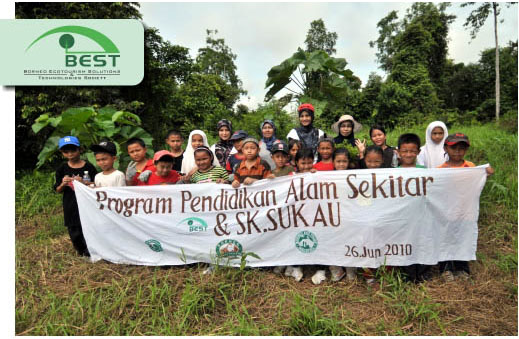
Here’s toast to 18 future world leaders, for they will inherit the environment that we leave for them.
There is an ancient Malay proverb which goes “melentur buluh biarlah dari rebungnya” which literally translates “when bending a bamboo plant, do it as its shoots” simply meaning that learning is beat done when at a young age. Arguably understood that learning is a lifetime experience, but it is when you are young and learning that it makes the biggest difference to change your course in life. Based on this belief, BEST Society in Sukau took up the challenge to initiate an educational outreach aimed at providing awareness on the importance of preserving the environment, to students from a nearby school. On 26th June 2010, at 7.00am, 18 students under 12years of age and four teachers from Sekolah Kebangsaan Sukau (Sukau National Primary School) participated in the one-day Environmental Education Program (Program Pendidikan Alam Sekitar) organized by members of BEST Society at the Sukau Rainforest Lodge. The simple program that was laid out for them will entire learning through exposure and interactivity and the eagerness was apparent from their bright smiles.
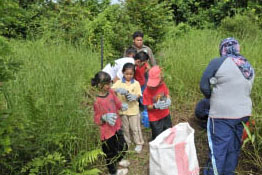 |
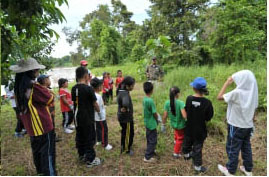 |
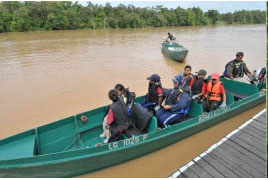 |
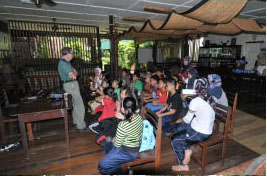 |
The group of school children that were chosen is from within the area of Sukau. And because of this, BEST Society seized opportunity to install a sense of ownership and appreciation for the beautiful asset that they have surrounding them, and to exemplify a conscious livelihood that could benefit their lives and the environment that they live in, and for many generations to come. From slide show, to leaf litter collection, to planting their own rainforest trees, to guided nature tour on Hornbill Boardwalk, it was apparent that learning is fun as the students diligently participated in every program which was lined out. Sealing the experience with personalized certificates, we hope that the lucky 18 would grow up to make a difference in themselves, the community, the country and finally to the world.
100 in Kimihang Coastal Cleanup
100 in Kimihang coastal cleanup
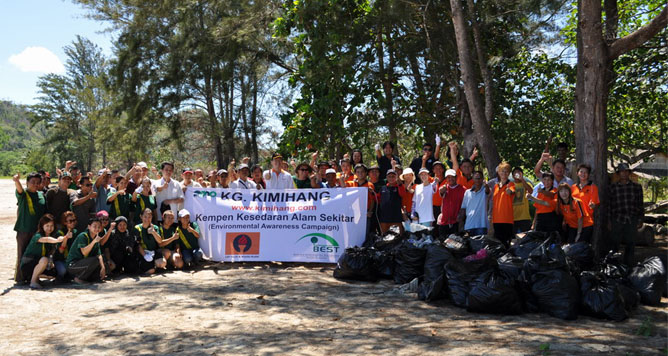
It was an important day for 100 participants comprising village folks from Kampung Kimihang Kudat, volunteers from the Borneo Ecotourism Solutions & Technologies Society (BEST) and LDP Youth & Wanita Kudat when they joined forces to clean Kimihang Beach, marking BEST’s Environmental Awareness Campaign which honors an early kick-start to the World Environment Day (which falls on 5th June) and the United Nation’s 2010 International Year of Biodiversity. Led by BEST’s Deputy Chairman, Mr. Baton Bijamin and staff of Borneo Eco Tours, Tanjung Kapor Assemblyman, YB Teo Chee Kang made a noteworthy presence when he joined in the gotong-royong, after delivering his message to all participants.
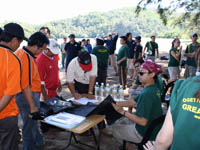 The beach cleaning program is aimed at creating awareness among the local communities on the importance of preserving a pristine environment, especially the benefits it brings to health and social life of the villagers. Kimihang Beach was chosen by BEST as the site for this year’s Environmental Awareness Campaign as it recently received international recognition by virtue of the Global Environment Facility Small Grant Program (GEF SGP) to develop a sustainable ecotourism-based community, due to the beautiful natural surrounding it has, and the uniqueness of the culture that bloomed within the area. The project will run for two years, to encompass strategies for community capacity building through various means of training and setting up of locally initiated enterprises that are based on globally accepted guidelines which will benefit the community and the environment.
The beach cleaning program is aimed at creating awareness among the local communities on the importance of preserving a pristine environment, especially the benefits it brings to health and social life of the villagers. Kimihang Beach was chosen by BEST as the site for this year’s Environmental Awareness Campaign as it recently received international recognition by virtue of the Global Environment Facility Small Grant Program (GEF SGP) to develop a sustainable ecotourism-based community, due to the beautiful natural surrounding it has, and the uniqueness of the culture that bloomed within the area. The project will run for two years, to encompass strategies for community capacity building through various means of training and setting up of locally initiated enterprises that are based on globally accepted guidelines which will benefit the community and the environment.
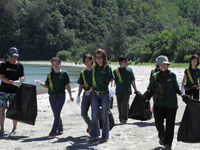 BEST Society, a non-profit organization funded by the Borneo Eco Tours and Sukau Rainforest Lodge has been actively advocating the conservation of environment and capacity building of local communities in Sabah since the year 2000. Among similar projects undertaken before this was in 2008, when BEST Society, along with the Environmental Action Committee Sabah (EAC) and Matunggong District office jointly organized the Terongkongan Environmental Care Campaign in Matunggong District, Kudat. Other successful projects worth noting are KWICORP (Kinabatangan Wildlife Corridor Regeneration Program), medical and water tank projects in Sukau.
BEST Society, a non-profit organization funded by the Borneo Eco Tours and Sukau Rainforest Lodge has been actively advocating the conservation of environment and capacity building of local communities in Sabah since the year 2000. Among similar projects undertaken before this was in 2008, when BEST Society, along with the Environmental Action Committee Sabah (EAC) and Matunggong District office jointly organized the Terongkongan Environmental Care Campaign in Matunggong District, Kudat. Other successful projects worth noting are KWICORP (Kinabatangan Wildlife Corridor Regeneration Program), medical and water tank projects in Sukau.
It is hoped that through this campaign, a good example is set for the community to instill within themselves a sense of place and ownership for the local surrounding and to continually educate the younger generation on the importance of preserving one’s natural environment.
Kimihang Environmental Conservation Project
Kimihang Environmental Conservation Project
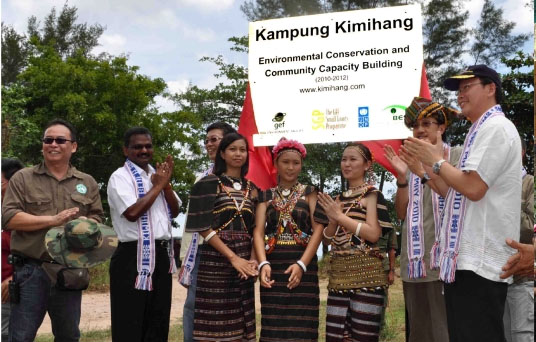
Kimihang Beach, Kudat – What would normally be a quiet day at Kimihang Beach, turned festive when the Environmental Conservation and Community Capacity Building Project, a strategic collaboration between BEST Society and GEF SGP, was launched by YB Datuk Masidi Manjun, Sabah Minister of Tourism, Culture and Environment, at 11.15am, Thursday.
Village folks in their colorful traditional Rungus garb and prominent community figures from Kudat and as far as Kota Kinabalu came to celebrate the launch which marks the start of the afore said project which will run based on a funding of USD 48,000.00 from Global Environment Facility Small Grants Program (GEF-SGP), financing various community building projects and strategies over a span of 2 years (2010-2012). The plan includes :
- Beach Cleaning and Environmental Awareness Education
- Tree Planting
- Herbal and Medicineal Garden
- Virgin Coconut Oil Workshop
- Motivational and Life Skills Seminars
- Setting up of a community based ecotour involving mangrove river and firefly cruise
- Setting up of a Code of Practice and training of ecotourism guides
- Conservation and sustainable use of offshore coral reefs and mangrove forest fringing the Loro River
- Setting up of micro enterprises
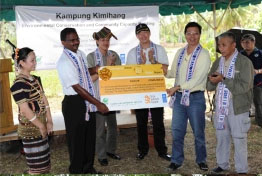 The Global Environment Facility (GEF) acts by forging international cooperation an financing ations to address six critical threats to the global environment: biodiversity loss, climate change, degradation of international waters, ozone depletion, land degradation, and persistent organic pollutants (POPs). The underlying rationale for support of all GEF projects is that some global environmental benefit is at stake, and the project seeks to address the threats or needs to ensure that the global environmental benefit is conserved , or sustainably used and managed. Funded by the GEF as a corporate program, the SGP or Small Grants Program is implemented by the United Nations Development Programme (UNDP) on behalf of the GEF partnership, executed by the United Nations Office for Project Services (UNOPS).
The Global Environment Facility (GEF) acts by forging international cooperation an financing ations to address six critical threats to the global environment: biodiversity loss, climate change, degradation of international waters, ozone depletion, land degradation, and persistent organic pollutants (POPs). The underlying rationale for support of all GEF projects is that some global environmental benefit is at stake, and the project seeks to address the threats or needs to ensure that the global environmental benefit is conserved , or sustainably used and managed. Funded by the GEF as a corporate program, the SGP or Small Grants Program is implemented by the United Nations Development Programme (UNDP) on behalf of the GEF partnership, executed by the United Nations Office for Project Services (UNOPS).
In his launching speech, Datuk Masidi urged people from Kimihang to cooperate and grow together, in line with the current global trends, and to support each other so that a synergistic approach is achieved. Datuk Masidi also advised the local community to steer towards progress and set aside petty feeling of jealousy and resentment which has been the ‘sticking factor’ for most rural communities in Sabah.
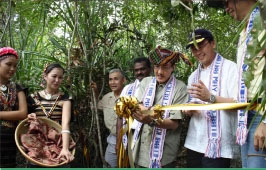 “When unity in the community is achieved, only then can growth take place”, he added. Also present at the site were N.2 Tanjong Kapor Assemblymen, YB Teo Chee Kang, Sabah Tourism Board’s Chairman, Tengku Datuk Dr. Zainal Adlin. Malaysia GEF SGP National Coordinator, Mr. Muthusamy Suppiah and BEST Society Chairman, Mr. Albert Teo. A mock cheque from Muthusamy Suppiah, the National Coordinator of Malaysia GEF SGP to Albert Teo of BEST Society for USD 48,000.00 was presented on stage, followed by an unveiling of the Kimihang Project Road Sign. The entourage then proceeded to plant 5 Ketapang seedlings, before moving onto a tour of the Kimihang Herb Garden and the Loro River Cruise after that, to showcasing several of the many natural attractions in Kimihang. The launch was also in conjunction with United Nation’s International Day for Biological Diversity which is celebrated on May 22nd every year.
“When unity in the community is achieved, only then can growth take place”, he added. Also present at the site were N.2 Tanjong Kapor Assemblymen, YB Teo Chee Kang, Sabah Tourism Board’s Chairman, Tengku Datuk Dr. Zainal Adlin. Malaysia GEF SGP National Coordinator, Mr. Muthusamy Suppiah and BEST Society Chairman, Mr. Albert Teo. A mock cheque from Muthusamy Suppiah, the National Coordinator of Malaysia GEF SGP to Albert Teo of BEST Society for USD 48,000.00 was presented on stage, followed by an unveiling of the Kimihang Project Road Sign. The entourage then proceeded to plant 5 Ketapang seedlings, before moving onto a tour of the Kimihang Herb Garden and the Loro River Cruise after that, to showcasing several of the many natural attractions in Kimihang. The launch was also in conjunction with United Nation’s International Day for Biological Diversity which is celebrated on May 22nd every year.
2011
Tree Planting and Environmental Education with EAC and SK Sukau
Tree planting and environmental education with EAC and SK Sukau
World Environmental Day is held every year on the 5th June. It is one of the principle vehicles through which the United Nations (UN) stimulates worldwide awareness of the environment and enhances the attention of “Green Tourism”. This year’s theme highlighted the relationship between quality of life and the health of forest with their ecosystem, with the theme “Forest: Nature at Your Services”.
India is the host this year where the prime celebration was held in New Delhi. Nonetheless awareness campaign was also held in interior of Sabah, namely Sukau Village. Kinabatangan River. Thumbs up to 20 future leaders of Sukau primary school in Kinabatangan River for they will play an important role in inheriting and educating their families and peers in waste management and execute the REUSE, REDUCE, RECYCLE concept in their livelihood to sustain the ecosystem of Kinabatangan River for future generation.
Following the success of forest regeneration program, both Sukau Rainforest Lodge (SRL) and Borneo Ecotourism Solutions and Technologies (BEST Society) continue its tradition with their ongoing tree planting projects. On 18th June 2011, BEST Society has taken the lead to initiate and joint forced with Environmental Action committee Kinabatangan (EAC Kinabatangan), an agency endorsed by the Sabah Ministry of Tourism, Culture and Environmental in organizing half day “Tree Planting and Environmental Education Program” involving these students and 3 teachers of Sukau primary school.
This group of students was enticed by a half day beneficial program from an interactive “biodegradable waste food management” on composting activities at SRL sundeck, to river cleaning along Kinabatangan River, and tree planting at Kinabatangan Wildlife Corridor Rehabilitation.
Throughout the program, the children were accompanied by Tuan Hamra Haji Liwangsa, the President of EAC Kinabatangan zone and guided by our SRL Lodge Manager together with SRL staffs. To support this auspicious mission, EAC Kinabatngan has contributed 100 seedlings and soil to BEST Society for its virtuous effort.
In his speech Tuan Hamra express that more of such program can be organized in initiaiting a joint responsibility between the government and the local community. He said “This is very warmth and personalize program, EAC will always support such environmental activities inititated by local NGO that can contribute towards enhancing environmental quality.“
The half day program ends with an educational jungle interpretation at SRL Hornbill Boardwalk and some brain twisting qizzes with prizes for the students.
From composting to river cleaning, planting their own tree and a well interpreted nature walk on the Hornbill Wlakway, the students were awarded a personalized certificate of participation for their proactive involvement in this program. With such educational activities, it is hope that these potential young leaders of Kinabatangan can inspire others in their community to take responsibility. Even small initiatives by them could literally create a significant impact to the sustainability of the world.
2012
Hari Hutan Bakau Sedunia
Hari Hutan Bakau Sedunia
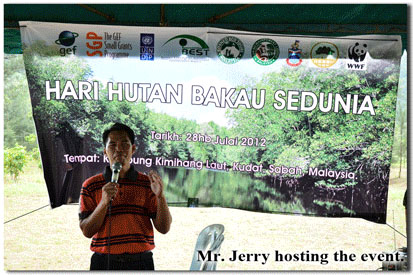
On 28th July 2012, about 150 participants comprising villagers from Kampung Loro, Kampung Kimihang Darat, Kampung Kimihang Laut, as well as students and teachers of SK Sikuati, SMK Sikuati I and II, SK Bangau and SK Kampung Minyak showed their support in the Mangrove Action Day at Kimihang Beach here. The event is part of the Kimihang Community Development project funded under the USD50,000 GEF-SGP grant received by BEST Society in 2010.
The event marked BEST Society’s recent effort to promote environmental awareness campaign to the local community to ensure they are continuously reminded about the importance of preserving a pristine environment for their own benefit. Representative from WWF Kudat, Ms. Suzianah Ramlee in her presentation emphasized on the benefits of mangrove and why conservation is important as well as the potential economic advantages the villagers can obtain from it.
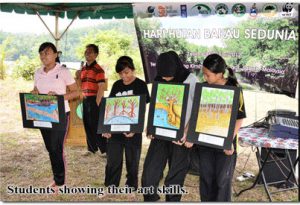 |
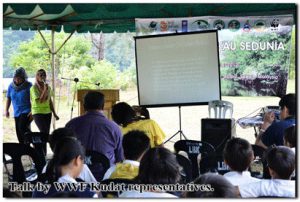 |
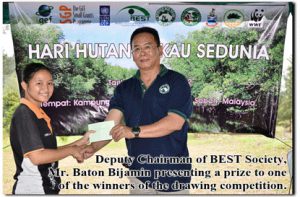 |
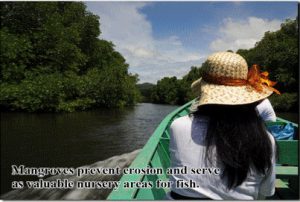 |
Among the activities held was the drawing competition that included secondary and primary school categories. The competition was aimed to inculcate the idea of protecting and conserving the beautiful nature especially the mangrove forest. The program received praise from one of the school teachers who described the event acts like a double edge sword because it helps students to value the nature and at the same time sharpen their skills in art. Over RM6,000 was spent to organize this meaningful event.
2013
Organic Farming Phase I, Sikuati
Organic Farming Phase I, Sikuati
On 19th June 2013, Albert Teo, the Chairman of Borneo Ecotourism, Solutions and Technologies (BEST) Society launched the Organic Farming Project which took place at Kg Rampai Besar, Kudat, Sabah, Malaysia. The launching coincided with the World Environment Day in 5th June.
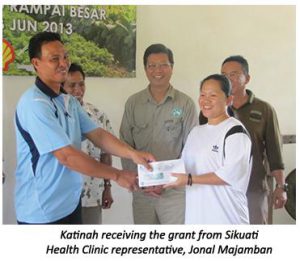 Thanks to the grant from Shell, ten families were selected to participate in this project. They are Freslie Bin Noyet, Marajun Bin Mulihin, Katinah Binti Lanyin, Rambus @ Rens Bin Soborong, Taisung Bin Umat, Tingkong Bin Umat, Salleh Bin Ng Kham Fatt, Jomil Bin Ojumpa, Disin B. Mulihin and Fred Bin Olinggang. A total of RM6,000.00 seed funds were distributed among them, of which each family received RM600.00. The balance of the grant will be used in later stage, which would include site visit and seminars.
Thanks to the grant from Shell, ten families were selected to participate in this project. They are Freslie Bin Noyet, Marajun Bin Mulihin, Katinah Binti Lanyin, Rambus @ Rens Bin Soborong, Taisung Bin Umat, Tingkong Bin Umat, Salleh Bin Ng Kham Fatt, Jomil Bin Ojumpa, Disin B. Mulihin and Fred Bin Olinggang. A total of RM6,000.00 seed funds were distributed among them, of which each family received RM600.00. The balance of the grant will be used in later stage, which would include site visit and seminars.
Among those present at the launching were the representative from Sikuati Health Clinic and 26 students with their teachers from SMK Sikuati. Two speakers were invited to give talks on organic farming and the benefits of organic farming. BEST Society will continue to work and collaborate with other relevant agencies such as the Agriculture and Kudat Health Department and individuals for education, motivation, technical workshops and site visits to other organic farms in the coming months.
2017
Borneo Land Conservancy
Borneo Land Conservancy

BEST Society together with our supporting networks through Borneo Land Conservancy initiative, focuses on conservation efforts on a piece of forested land in Sukau measuring 7.7 acres as part of ‘giving back to nature,what belongs to nature’. The land was up for sale and the decision to buy was made quick solely for the purpose of conservation and later, research and education. The area may seem small but vital as it serves as a home to our wildlife along the Kinabatangan River.
Read More2018
Battling Plastic with Bamboo Straws
Battling Plastic with Bamboo Straws
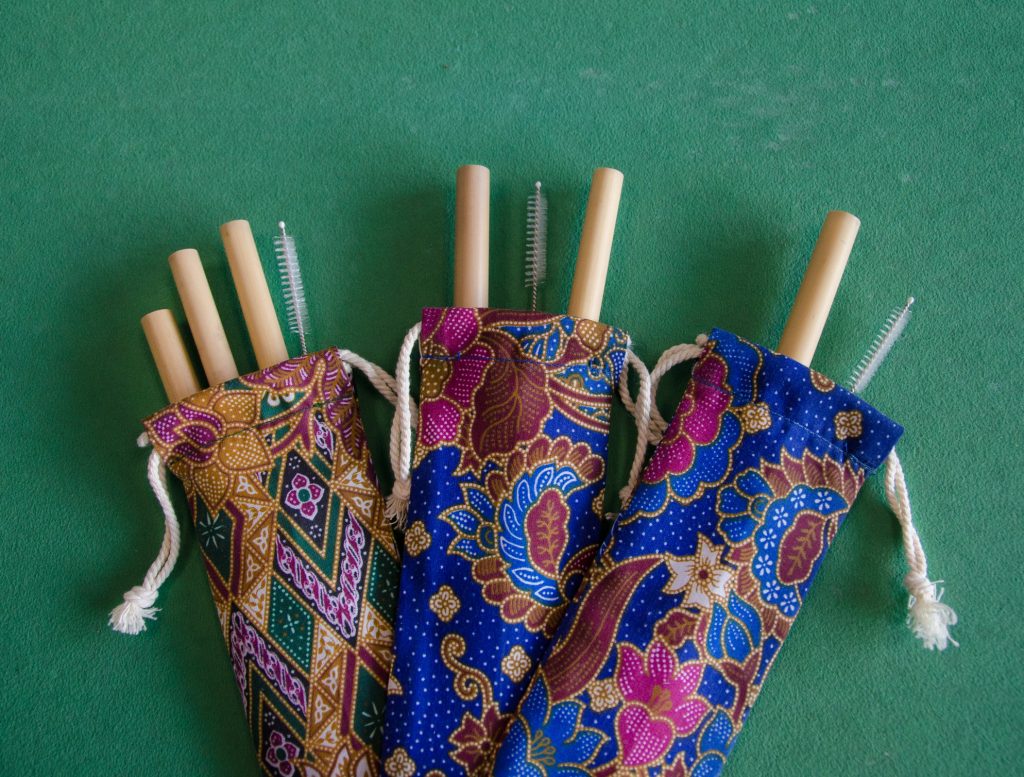
BEST Society amplify its efforts for the environmental damage human have caused by promoting 100% natural bamboo straws as an alternative to plastic straws. At the moment, the producers are a small group of local folks in Ulu Kiulu- each step of our production process from harvesting raw materials into finished products relies on expert local knowledge. This not only have a positive environmental impact but also a positive social impact. We are proud that throughout this process families and communities are empowered.
2019
Sukau Ecotourism Research Centre
Sukau Ecotourism Research Centre
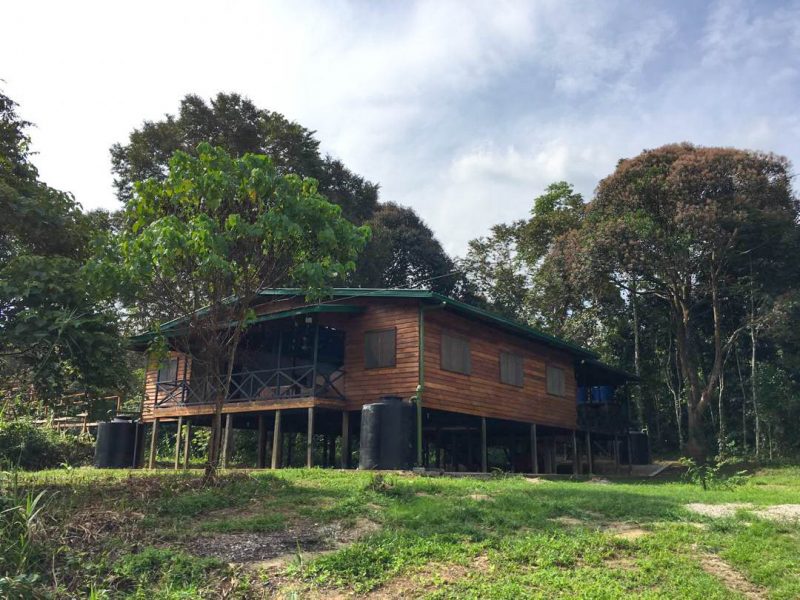
VISION
To transform Kinabatangan into a global ecotourism destination
MISSION
To become the leading visionary/contributor and advocate in ecotourism and conservation through facilitating impactful researches





